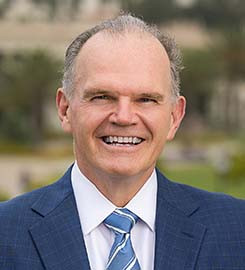
UPDATES
Response to Tenure Track Faculty Letter on NTT Faculty
March 18, 2024

Providing the best possible work environment for our faculty, regardless of their rank, is vitally important to our community. The members of our USD community are proud of our culture of care and our mission to uphold human dignity. Rooted in our Catholic values, our culture of care is regularly cited as one of the distinguishing and most appreciated characteristics of our campus.
This culture was not created by accident – it was created by members of our community working together intentionally, in direct relationships with each other.
Our NTT faculty are valued colleagues, and their contributions are significant. Over the past decade, the university has made great strides in enhancing and supporting the work of NTT faculty, and this continues to be a priority.
We also understand that there is more to be done. We are committed to working collaboratively with NTT faculty to create the best possible learning environment for our students and work environment for our faculty.
We should ensure that the information considered by all interested parties is accurate, and that everyone is fairly informed so they can make the best decision for themselves and their families as the effort to organize in CAS proceeds. USD encourages every member of our community to ask questions and learn more about unionization – both its pros and cons.
USD respects the right of every individual to form their own opinion and encourages each member of the community to consider whether, and how, inserting a third party might impact our culture of working directly and collaboratively with one another. USD will continue to share information.
From: Gail F. Baker, PhD, Senior Vice President and Provost
To: All USD Faculty
Dear Dr. Keeling and Faculty Colleagues,
Board of Trustees Chair Mulvaney and President Harris received a letter from some of your colleagues in the College of Arts and Sciences (CAS) dated March 7 with the subject “TT Faculty Letter Supporting a Free and Fair Process of NTT Faculty Unionization.” We also are aware of outside efforts to encourage non-tenure track (NTT) faculty members within CAS to unionize. Because this is first and foremost a faculty issue, I am responding.
We are committed to working with you to create the best possible learning environment for our students. I know we all agree that providing the best possible work environment for our faculty, regardless of their rank, is vitally important to our community. USD is proud of its culture of care and its mission to uphold human dignity. Rooted in our Catholic values, our culture of care is regularly cited as one of the distinguishing and most appreciated characteristics of our campus. This culture was not created by accident – it was created by members of our community working together intentionally, in direct relationships with each other.
Our NTT faculty are valued colleagues, and their contributions are significant. Over the past decade, we have made great strides in enhancing and supporting the work of NTT faculty, and we continue with those efforts across the university. We also understand that there is more to be done.
We should ensure that the information considered by all interested parties is accurate, and that everyone is fairly informed so they can make the best decision for themselves as the effort to organize in CAS proceeds. I encourage every member of our community to ask questions and learn more about unionization – both its pros and cons.
In closing, I want to reiterate that we respect the right of every individual to form their own opinion. I would be remiss, though, if I did not encourage each of us to consider whether, and how, inserting a third party might impact our culture of working directly with one another.
Maintaining the best possible work environment for our faculty, both tenure track and non-tenure track, is essential to the academic vitality of our campus. This commitment includes our mission to uphold human dignity and support one another in our pursuit of knowledge. Rooted in our Catholic values, our culture of care is regularly cited as one of the distinguishing and most appreciated characteristics of our campus.
This culture was not created by accident – it was created by members of our community working together intentionally, in direct relationships with each other. The possibility of losing this collaborative environment to a third party would undermine the very core of what makes us unique.
But the concerns of our NTT faculty are real, and we hear you.

The Office of the Provost, faculty committees, and many others at USD have been in substantive conversations with NTT faculty members to identify opportunities for enhanced job stability, compensation, and advancement. The Provost conducted listening sessions with NTT faculty members across USD consistently over the past two years to learn about their concerns and determine how the university could address them. In fact, we had already begun to implement improvements based on these discussions. That’s why we were surprised to learn that the SEIU was working with members of our NTT faculty to form union within the CAS during what we thought was a productive, proactive dialogue.
As fellow academics, your passion is the pursuit of research, education, and scholarship toward truth and discovery. This process should be no different. I encourage every member of our community, particularly our NTT faculty, to ask questions and learn more about unionization – both its pros and cons – before making a decision. We will continue to share information to support you.
Peace,
Jim